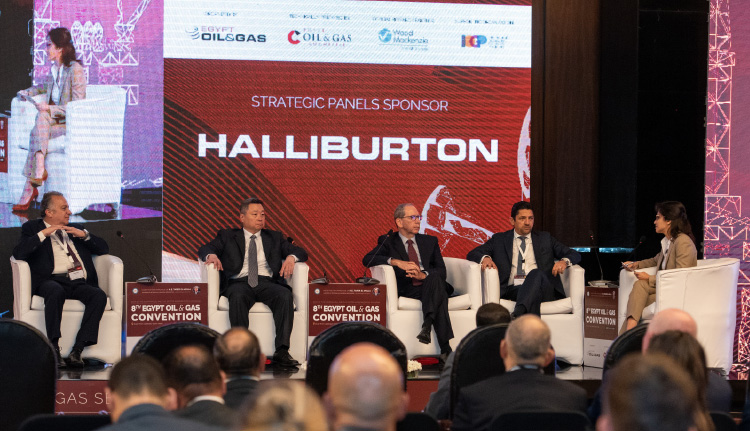The first day of the 8th EOG Convention witnessed engaging panel discussions, sponsored by Halliburton, titled “Oil & Gas Sector Decarbonization Pathways” and “Carbon Capture and Storage Opportunities in Egypt”.
“Oil & Gas Sector Decarbonization Pathways” was moderated by Layla El Hares, Managing Director at Siemens Energy, and witnessed the participation of EOG Committee Chairman David Chi, Vice President and Country Manager – Apache Corporation, Undersecretary for Projects Ministry of Petroleum & Mineral Resources Ahmed Khalifa, Cheiron Petroleum Corporation CEO Dave Thomas, and Tameer Nasser, Director and General Manager Egypt & Sudan – Baker Hughes. One of the main points of this discussion was the importance of gas in decarbonization and the various approaches that should be used in Egypt to ensure emissions reduction.
Nasser stressed that technology plays an integral part in guaranteeing a positive impact such that the energy sector can remain fully committed to minimizing harmful emissions. “Technology has to be accelerated, there is no doubt about that.”
During his part of the panel, Chi emphasized that decarbonization is an initiative that all economic sectors need to be involved in. “To get to a net zero by 2050 or earlier, one, we have to reduce the emissions that we have today, it doesn’t matter in which sector you are…. Two, we need to capture carbon.”
Capture carbon was just the point that the second panel discussion, titled “Carbon Capture and Storage Opportunities in Egypt,” addressed. It was moderated by Nihal AbdelKarim, Development Engineering Manager at IEOC, and witnessed the participation of Energean Egypt Country Manager Nicolas Katcharov, IOGP Energy Transition Director Concetto Fischetti, SLB Managing Director Egypt and East- Mediterranean Sherif Bayoumy, Wintershall Dea Egypt’s Managing Director and Senior Vice President Sameh Sabry, and Egyptian Natural Gas Holding Company (EGAS) Vice Chairman for Energy Transition and Sustainability Samir ElKareish.
For ElKareish’s part, one of the main obstacles that the industry faces today is fiscal challenges, which are proving to be a hindrance to carbon capture & storage (CCS). “The main challenges facing CCS, in particular in NOCs, is financing.”
As for Fischetti, cooperation between state and private corporations is really at the center of what needs to be accomplished in order to realize tangible results. “CCS is a private-public collaboration where everyone should do his own part, starting from the oil and gas companies.”
For Wintershall Dea’s Sameh Sabry, technology and awareness are really the fundamental pillars for a successful CCS strategy. “What [we] need to move on now is to increase knowledge on the latest technology, not only the technology but also the whole framework,” Sabry said.
SLB’s Sherif Bayoumy was also quick to point out that even with the right technology available, a roadmap needs to be finalized to set a framework. “I think technology is there, and we should all set and have a roadmap for Egypt with ground rules, for these projects are quite CAPEX-intense, quite budget-intense.”
Apart from roadmaps, the legal framework also needs to be put in place and according to Energean’s Katcharov, this is already in progress. “EGAS, EGPC and the government are probably working on [carbon storage] regulations. This is probably an opportunity because by experience I can tell you that regulations in Egypt are much faster than in Europe. If there is a business for (carbon storage), then the regulation will come very quickly. ”








